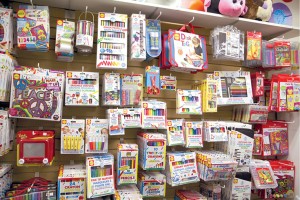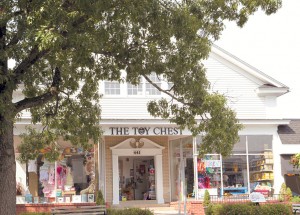by Reece Alvarez, Danielle Brody and Evan Fallor
Main Street businesses across Westchester and Fairfield counties are holding their own against online and big-box competitors with a steady stream of loyal customers and community support during what is expected to be a slightly down back-to-school shopping season.
Families are expected to cut back-to-school spending by an average of almost $40 per household, according to a July study by the National Retail Federation, a Washington, D.C.-based retail trade association.

- Store managers Bill Bellion and Whitney Williams at Squash”™s Ridgefield Office Supply. Photos by Danielle Brody
Jim Raneri, co-owner of the 90-year-old Charles Department Store in Katonah, has a different take on the slow start of the back-to-school season. Raneri thinks a better economy this summer coupled with low fuel prices have residents extending their summer vacations.
“It has been a little quiet because I think a lot of people went away this year ”” big time,” he said.
As Raneri”™s season begins to ramp up, he said he has seen an increased focus by his customers on necessity items and more specific to the season purchases of off-campus living items for college students.
“People are getting back to basics,” he said. “They are not spending a lot of money on frilly items.”
While Raneri”™s season is just getting started, 30 miles south the boutique-lined streets of Bronxville have seen a steady stream of shoppers, according to owners. Though the Cross County Shopping Center and its array of clothing retailers are just a five-minute drive away, Adrian East, owner of the eponymous clothing shop on Kraft Avenue, said that didn”™t slow what was a very profitable August.
East found that most families and individuals are buying fall and winter items, like light dresses, shorts and tops as well as snowsuits and winter coats rather than conventional back-to-school apparel.
“My main competition is not the department stores, but rather the specialty stores and better boutiques,” she said. “I try not to carry the same products that can be found in department stores.”
On Pondfield Road, Bronxville Stationers owner Johnny Lee said a school supply partnership with the village”™s elementary school has drawn customers and he has hopes for a boost in business in the coming weeks.
“This year”™s business is about the same as last year”™s,” Lee said. “Maybe next week it will get even busier.”
Though Hastings Stationery manager Kenny Jung said business has been hampered by the likes of Staples and other area big-box chains, the store was bustling on a recent afternoon. Parents and children, including a group of four girls buying a combined 13 notebooks, filled the store before village schools opened the following day.
With binders starting at $2.99, Jung said a major selling point of the Warburton Avenue business is its convenience and competitive prices.
“It”™s easier to come in here as opposed to going all the way to Staples,” Jung said. “Luckily in Hastings, everyone tries to support local businesses.”
Across the border
Bill Bellion, a store manager at Squash”™s Ridgefield Office Supply, said he hopes to get some crossover business from New Yorkers still shopping for back-to-school items.
In business more than 40 years, Squash”™s is one of the last remaining shops of its kind in the area. Bellion said parents like coming in because the staff is knowledgeable.
The store has benefited from a following of longtime residents and newcomers who often start out shopping at the big stores until they discover Squash”™s, he said.
“Once they know that we”™re here, it”™s like a fish ”” you grab them, you hook them and you pull them in,” he said.
As in Hastings, Squash”™s has also capitalized on community support from local schools to deliver value packs with all the supplies kids need as part of a currently expanding partnership program, said Whitney Williams, assistant store manager.
“Parents love the fact that they”™re supporting the town,” she said.
She said many of her store”™s prices are about the same or cheaper as big box stores.
Williams shopped at the store when she was a child and now brings her own children there to shop. She said lifelong residents like that the store has remained the same.
While not able to carry the massive stock of big-box stores, the store keeps prices about the same or cheaper than larger competitors by keeping a lean inventory and filling specialty custom orders quickly, she said.
But it is not only big-box stores that are keeping Main Street businesses on their toes.
“We are competing against the big-box stores and the Internet. We carry a lot of things that can be bought on the Internet, but the problem is the consumer needs information on product,” Raneri said, in Katonah. “The big issue right now is to be able to survive in this kind of an environment.”
More than 35 percent of back-to-school shoppers are expected to spend their money online, according to the NRF study.
“To ease hectic schedules and long shopping lists, it”™s likely that we”™ll continue to see consumers try out and regularly use services like free shipping, reserve online and even same-day delivery ”” options busy parents have been waiting for,” said Pam Goodfellow, principal analyst with Prosper Insights & Analytics, which helped conduct the study.
The average family with children in grades K-12 is expected to spend $630 on electronics, apparel and supplies, down from $669 in 2014. Still, families on average have spent 42 percent more on school items in the past decade, and total spending this year is expected to reach $24.9 billion, according to the NRF study.
The need for information and most importantly, on-demand service, is an opportunity for Raneri and his staff to show off their product knowledge and earn repeat business through their hands-on approach guiding customers through their purchases, he said.
“That”™s what makes the big difference between a small store like ours and a big-box store ”” it is all about customer service,” he said. “And the experience carries on even after you sell the product to the customer.”


















